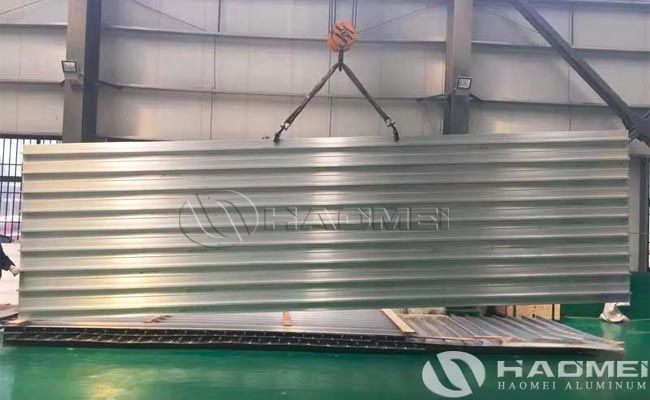Prefabricated Friction Stir Welding Panels For Shipbuilding
Prefabricated friction stir welding panels (FSW panels) are high-performance ship structural materials manufactured using solid-state joining technology. Large scale prefabricated panels are welded from aluminum alloy extruded profiles or plates using the friction stir welding (FSW) process. Prefabricated friction stir welding panels have important applications in shipbuilding. Friction stir welding is a solid-state welding process that uses a rotating tool to generate frictional heat on the workpiece surfaces, causing the metal to reach a plastic state without melting, thus achieving welding. In shipbuilding, prefabricated FSW panels are commonly used to join hull structures, cabins, and other critical components. Due to their excellent mechanical properties and corrosion resistance, they are widely used in the construction of high-speed vessels, cargo ships, LNG carriers, warships, and other types of ships.

Production Process of Prefabricated Friction Stir Welding Panels:
- Material Selection:
The mainstream aluminum alloys used are 5000 series (such as 5083) and 6000 series. They offer high strength, corrosion resistance, and weldability, making them suitable for critical areas such as LNG tanks and high-speed vessel decks.
- Extrusion and Welding:
Aluminum alloy is first extruded into ribbed profiles (such as T-shaped and U-shaped profiles). Multiple profiles are then welded together into wide plates (widths exceeding 1250mm) using the FSW process, creating a "plate-ribbed integrated" structure.
- Quality Control:
AI algorithms (such as neural networks and fuzzy inference systems) are used to optimize welding parameters (rotation speed, feed rate, etc.), and real-time weld monitoring is achieved through technologies such as laser tracking and ultrasonic testing.
Core Applications of Prefabricated Friction Stir Welding Panels in Shipbuilding
- High Speed Vessels and Aluminum Alloy Ships
Lightweight Hull Structure: The Russian Prometheus Research Center uses FSW technology to produce aluminum alloy welding panels, reducing hull weight by 20-30% while simplifying the assembly process. These plates have been used in high-speed ferries and small vessels.
Deck and Hull Structure: Norway's Hydro Marine Aluminium once produced 1,700 FSW panels for a high-speed ferry, with a total weld length of 110 km. The friction stir welding panels can be rolled and transported, significantly reducing logistics costs.
- LNG Carrier Tanks
Low-Temperature Performance Advantages: 5083 aluminum alloy maintains excellent toughness at -163°C, and its FSW welds offer strength and sealing properties that meet the stringent requirements of LNG tanks. IHI Corporation of Japan uses FSW technology to weld SPB-type tank plates, achieving deformation-free fillet welds and improving tank reliability.
Large-Scale Trend: LNT Marine has launched a 170,000-cubic-meter LNG carrier solution based on FSW aluminum alloy panels, optimizing ship energy efficiency by reducing the number and weight of welds.
- Warships and Specialized Vessels
The US Sea Fighter warship uses FSW welded aluminum decks, reducing structural weight while improving corrosion resistance and adapting to complex marine environments.
Explosive Forming Structures: The University of Adelaide in Australia used FSW to weld 5mm thick 5083 aluminum alloy plates and then fabricated the bow section using high-energy explosive forming, demonstrating the feasibility of this technology for complex curved structures.
Technical Advantages of Prefabricated Friction Stir Welding Panels:
- Performance Advantages
High Strength and Low Deformation: The tensile strength of the weld can reach over 90% of that of the parent material, and the width of the heat-affected zone is only 1/10 that of arc welding, significantly reducing subsequent shaping steps.
Corrosion Resistance: FSW avoids the molten pool oxidation problem associated with arc welding, resulting in welds with superior salt spray corrosion resistance to traditional welded joints, making it particularly suitable for seawater environments.
Low Heat-Affected Zone: Due to the relatively low temperature during welding, the heat-affected zone is small, reducing material deformation and the need for post-weld treatment.
Excellent Weld Quality: Friction stir welding effectively avoids weld defects such as porosity and inclusions, improving the overall performance of the joint.
- Economic Benefits
Improved Production Efficiency: Prefabricated panels are mass-produced in factories, reducing on-site welding workload at shipyards. For example, a single unit of wide-width panel welding equipment can weld 60 square meters of panels, achieving over three times the production efficiency of traditional processes.
Reduced Cost: The application of FSW systems has shown that the cost per meter of weld is lower than that of arc welding wire. Furthermore, the lightweight design reduces fuel consumption and lowers operating costs throughout the vessel's lifecycle.
- Environmental Protection and Sustainability
Low Energy Consumption and Zero Emissions: FSW requires no shielding gas or filler material, consumes only one-third the energy of arc welding, and produces no arc light, smoke, or other pollution.
Material Recyclability: Aluminum alloy FSW panels have a recycling rate of up to 95%, aligning with the trend of green shipbuilding.
Prefabricated friction stir welding panels, with their lightweight, high-performance, and low-cost advantages, have become a core technology in modern shipbuilding. With the continuous advancement of materials science, intelligent manufacturing, and industry standards, FSW technology will be widely adopted in more ship types, driving the shipbuilding industry's transformation towards a greener and more efficient future.








